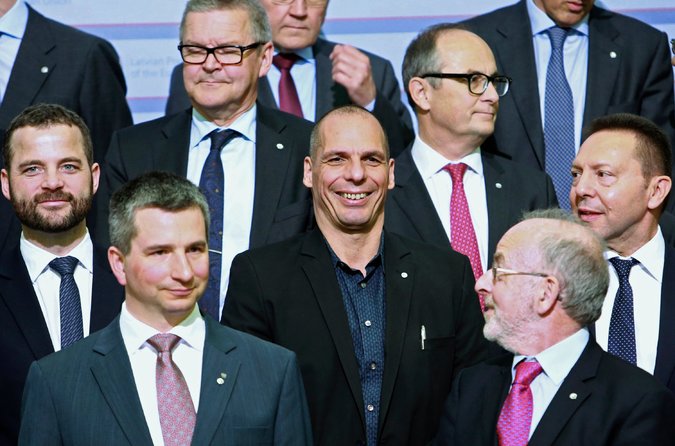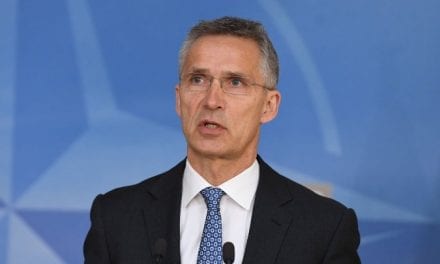By JAMES KANTER, New York Times
The comments, expressed as finance ministers assembled here in the Latvian capital, were some of the strongest signs yet of rising concerns about the economic situation in Greece and the commitment of the country’s finance minister, Yanis Varoufakis, to address it.
“I’ll be quite frank — it was a very critical discussion,” Jeroen Dijsselbloem, the president of the Eurogroup of eurozone finance ministers, said after the meeting. “We had hoped to hear a positive result,” he added, but “we are still far from that.”
Mario Draghi, the president of the European Central Bank, which is one of Greece’s biggest creditors, warned that “time is running out” for resolving the Greek standoff.
Hans Joerg Schelling, the Austrian finance minister, told reporters that the standoff with Greece “cannot continue like this” and that he was growing “annoyed.”
Peter Kazimir, the Slovakian finance minister, said, “We talk, talk, and the substance is missing.”
A potential default by Greece is the biggest near-term risk to the European economy, which has begun a tentative recovery after a prolonged sovereign debt crisis that nearly sank the euro at the beginning of the decade. Yet the meeting on Friday yielded no concrete plans to accelerate the talks, and Mr. Varoufakis gave no sign of yielding to pressure.
“We are striving to come to an agreement with the institutions regarding promises and a plan that we can take to the Greek people, and that we can ask the Greek people to fall fully behind,” Mr. Varoufakis told a news conference after the meeting.
The frustration with Greece is boiling over more than two months after the international lenders gave Athens until late June to present plans for reforms that would both ease austerity and overhaul its economy.
The lack of agreement on those plans means European lenders will not release the next allocation of bailout money — a 7.2-billion-euro, or $7.5 billion, payment — to keep the Greek government running and avoid a potential default.
Mr. Dijsselbloem said it was up to Mr. Varoufakis and his government to present more ambitious proposals, noting that the next scheduled gathering of the Eurogroup would be on May 11, a day before Greece must pay €750 million to the International Monetary Fund as part of its loan agreements.
There was “a great sense of urgency around the room,” acknowledged Mr. Dijsselbloem.
As negotiations have continued between Greece and representatives of its creditors in recent weeks — meetings separate from the periodic gatherings of the finance ministers — the two sides are said to remain divided on significant issues. Greece has insisted that it cannot cut pensions any further or accept creditors’ demands for a budget that would require a relatively high primary surplus — a surplus when debt repayments are not taken into account.
Greek officials have insisted that these issues are “red lines” that cannot be crossed, and Mr. Varoufakis underscored them in his comments to reporters in Riga.
Some of the antagonism between the Eurogroup and Greece stems from continuing disagreement over whether lenders can conduct fact-finding at Greek ministries in Athens, to verify the true state of the country’s finances, for example, rather than meeting in hotels with Greek officials.
A Finance Ministry official in Athens on Friday, speaking only on the condition of anonymity because of the political tensions surrounding the discussions, said that the Greek government was “not bluffing” in opposing tough measures and was intent on protecting the country’s interests.
Mr. Varoufakis, speaking separately to Greek reporters in Riga on Friday said that the country had submitted a new, revised list of reforms at a discussion between deputy finance ministers this week — but that the document had not been presented to the Eurogroup for procedural reasons that he derided as unnecessarily complicated. He accused eurozone officials of “undermining tactics” and “negativism” and said the climate in Friday’s meeting had been tense, although he denied reports by some news media that officials had verbally attacked him.
Mr. Varoufakis told the Greek reporters that the country was prepared to push the deadlines on the debt deliberations: “There is a negotiation where you have 30 days to reach a deal with someone. Why do it on the 20th day when you can continue and push for something better on the 21st? Or the 22nd? You keep going until the 30th.”
But Mr. Draghi of the European Central Bank, appearing alongside Mr. Dijsselbloem at their news conference, warned Greece: “Time is running out.”
“There can’t be an agreement if people don’t have an adequate process to assess, quantify policy measures,” Mr. Draghi said.
As the crisis drags on, one big concern is the ability of Greek banks to stay afloat. Mr. Draghi said that the European Central Bank’s emergency financing for Greek banks should continue as long as they were “solvent and have adequate collateral.” But he also warned that “a change in the environment” could force the central bank to make that financing more expensive for the Greek banks.



















